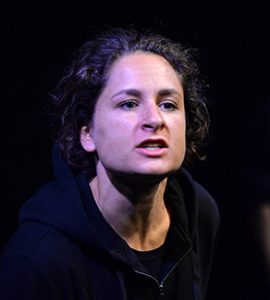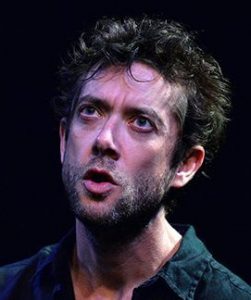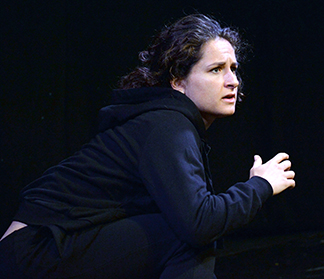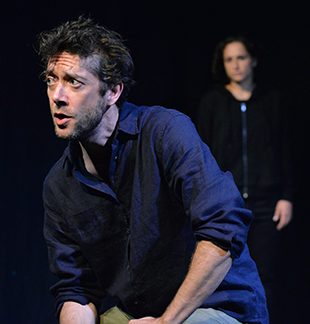By Lucy Komisar
It‘s 1998. The 6-year-old Syrian Christian draws. Her father wants her to be an artist. There are secret police in her playground.
Sebastian, an idealistic photojournalist just out of university, accompanies a reporter who has gotten an interview with a man hiding in a cave. He takes photos of Osama bin Laden. Sebastian is 21 and wants to change the world. He has some minutes of celebrity through his photos of bin Laden, but he can‘t make a go of serious photojournalism, can‘t sell his pictures.

“Borders” is the fourth in Henry Naylor‘s Arabian Nightmares Series inspired by the catastrophes of the wars in the Middle East. It is the interweaving monologues of two artists, in which one, a Syrian (a vivid Avital Lvova), identified as Nameless, uses art to fight for political liberation and the other, the Brit Sebastian Nightingale (the intense Graham O‘Mara), trades photojournalism to take pictures of celebrities.
The story shifts between the two on adjacent stools, each delivering monologues that graphically paint the politics of the surroundings. Naylor’s dialogue is journalistic in its authenticity, and theatrical in its effect. Director Michael Cabot uses two actors to create a cinematic production that makes you think you are there.
The young woman will become a courageous graffiti artist risking her life to spray-paint slogans denouncing Assad. Graffiti artists in fact played an important role in the Syrian uprising. During the Arab Spring, some children who wrote “You‘re next Dr. Bashir” on their school wall were tortured. Protests fuel the war. Her parents are seized. She wants to avenge her father. She protests, Not Sunni, not Alawite, Freedom is what we all want.

She joins the revolution. Activists are shot dead. She is imprisoned, she describes a woman hung by her arms, then the women are released as not so much of a threat. At a park, she paints under a statue: ˜The Assads: Your Local Family Butchers. She senses Art‘s power.‘
The photographer goes on British TV to talk about bin Laden. When he says he was “dull,” which is what western journalists who interviewed him reported, his agent protests that won‘t sell. So he declares, I met a Supervillain. He didn‘t have a freeze ray or laser gun. He just had an idea and a 50 billion bank account. He recounts that Eamonn [Holmes, a prominent British TV news host] almost orgasms on the spot.”
Farah marries. (We learn her name is Farah only at the end, as she represents all such women who are anonymous to the West.) She suffers barrel bomb attacks, her husband is jailed and tortured. She is threatened by the arrival of foreign jihadis. One who is also spray-painting against Assad orders her, Cover yourself, whore. And spits. She sprays paint in his eyes like Mace. She says, “He screams, face dripping red, I run, leaping over rubble. Bullets crack.”
Sebastian becomes the official photographer of a live music event. Clinking ice in a glass, he thinks about a refugee he once tried to save in a small boat.

When Farah becomes pregnant, she decides to join some 5 million Syrians fleeing the war for Europe. But the West that provoked the war now has borders. It’s the Mediterranean, 2017.
At a party for a show about his work, Sesbastian runs into a print journalist who remarks, You‘re a celebrity, now.
Yes.
One “of them.”‘
So. What are YOU working on?
Messenger: Syrians in the Mediterranean.
Oh, is that still going on?
More than ever. 600,000 at the last count.
For those who follow British journalism, Messenger is modeled on John Pilger.
Messenger tells him: He fucking won, you know. He wanted the division of the communities and he got it. We did it for him. We built walls. We built borders. Round our hearts. Round our minds. All these desperate people, asking for our help – homeless, and tortured – and we all start voting – the Americans, the Brits, the French – we all start voting for them to fuck off and drown.

Later, Messenger phones Sebastian: Got you a gig. A UN fact finding mission in the Med. Patrol boat seeking refugees.. Sebastian is about to say no.
Then: It‘s with Angelina Jolie.
“Yes yes yes.”
An old fishing boat loaded with refugees is sinking. Farah is six months pregnant and can‘t swim. The stories converge. Sebastian is still a photo-journalist, still looking for the money shot. And now refugees are trending.
It‘s Naylor‘s ironic morality tale. Suddenly you make the connection between the courage of the brave pro-democracy fighters and the westerners with other priorities who left them to sink and suddenly return to share glory on their “rescues.”
O‘Mara is terrific as Sebastian, scraggly, sophisticated, full of intellectual fury. Lvova is moving as the Syrian, almost na¯vely direct. An important play for our times.
“Borders.” Written by Henry Naylor, directed by Michael Cabot. Gilded Balloon at Edinburgh Festival Fringe. August 2017. 8/15/17.

